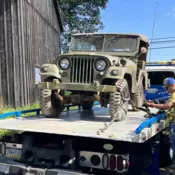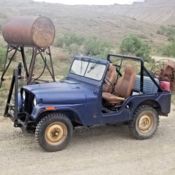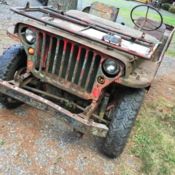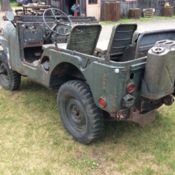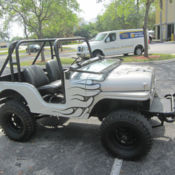1956 Willys Jeep, M38 A 1, Jeep Nekaf, Military Radio Vehicle Original and Rare
Price: -
Item location: Gilbert, Arizona, United States
Description:
1956 Willys M 38 A1
The vehicle with the longest service record in the Dutch military, erving in the Royal Army for more than 40 years from 1952 until 1996, s the M38A1 Jeep. During and shortly after World War II, he Dutch army used jeeps left behind by American forces. By the early 1950's however, he army was looking for a replacement, nd in 1952 received a number of U.S.-built M38A1's under the Mutual Defence Assistance Program The army had two principal options for purchase of additional vehicles: the M38A1 and theDAF YA 054 light terrain vehicle. The DAF was designed by the Dutch company of the same name, ith the requirements of the Royal Army in mind, ut may have lost the race simply because its price was a couple of hundred guilders higher than the M38A1's. According to the contract with Kaiser-Willys, arts for the Dutch M38A1 Jeeps were to come from the U.S., ut as an aid to the Dutch industry, he Jeeps would be assembled at the "Nederlandse Kaiser-Frazer" (NEKAF) factory in Rotterdam. The first of what became known as the "Nekaf Jeeps" was delivered on 28 May 1955. The initial order was for 4000 Jeeps, lus a rolling prototype which served the purpose of establishing the conformity of all parts. Eventually some 24 percent of the parts would be delivered by local suppliers. Batteries and tires were supplied by Dutch firms Bataafse Accufabriek (now known as Varta), nd Vredestein. This increased the price of a Nekaf to 12,670 Dutch guilders, hich made it a very expensive vehicle at that time. The Nekaf Jeep was basically an M38A1 with a few additions needed to comply to the Dutch traffic regulations of the time: extra reflectors screwed to the front fenders, ow-intensity "city lights" added to the grille, nd turn signals mounted to the left and right sides of the tub just behind the seats. The Nekaf was equipped with a canvas roof; provisions were made for mounting a hardtop but these were not used in the Dutch army. At start of production, aiser-Frazer delivered about 55 Nekafs per week. An additional order for another 150 Jeeps for the Royal Army was placed in 1956, s well as an order for 156 Jeeps to be delivered to the Air Force. However, eliveries apparently went down to 27 per week by 1957, nd production finally ceased when the factory was faced with a large penalty for failing to make deliveries at the rate stated in the contract. The 5676th and last Kaiser-Frazer-produced Nekaf was delivered to the army in 1958. The Dordrecht firm Kemper & Van Twist Diesel took over production from 1958 to 1962, nd held on to the "Nekaf" name. Kemper & Van Twist assembled about 2000 Jeeps. When the Ministry of Defence (then called Ministry of War) decided to acquire the Nekaf, ts life was expected to be twenty years; ten years in active duty and the remainder in storage. During the 1960's and beyond, hanged priorities meant the Ministry spent a large part of its budget buying tracked and wheeled armoured vehicles for the mechanization of the Royal Army. There was no money left to replace the Nekaf, nd therefore the Jeep remained in active service much longer than originally intended. Alongside the standard issue Jeep used for general purposes, he Nekaf was used as a radio Jeep, mbulance, ire engine and snow plow. After 1959 it was used as a weapons carrier equipped with the 106mm M40 recoilless rifle (in Dutch, Terugstootloze Vuurmond" or TLV.) With the use of American part sets, 55 Nekafs were converted toM38A1C TLV carriers. In order to be able to carry the extra weight of 217 kilograms, eavier springs were mounted. The windshield had separated window panes, gun barrel support was mounted, nd ammunition storage racks were added. From 1983 until 1989, orty M38A1Cs were equipped with cable-guided TOW missiles.Vehicle Details:
- Condition: Used
- Make: Willys
- Model: M 38 A1
- Trim: jeep
- Year: 1956
- Mileage: 1
- VIN: M38A1
- Color: olive green
- Engine size: 4 cyl
- Number of cylinders: 4
- Fuel: Gasoline
- Transmission: Manual
- Drive type: 4 wheel drive
- Interior color: khaki
- Options: 4-Wheel Drive
- Vehicle Title: Clear Want to buy? Contact seller!
